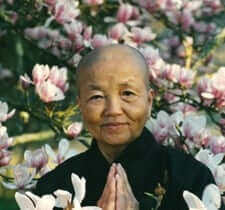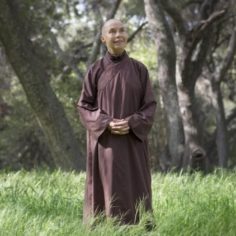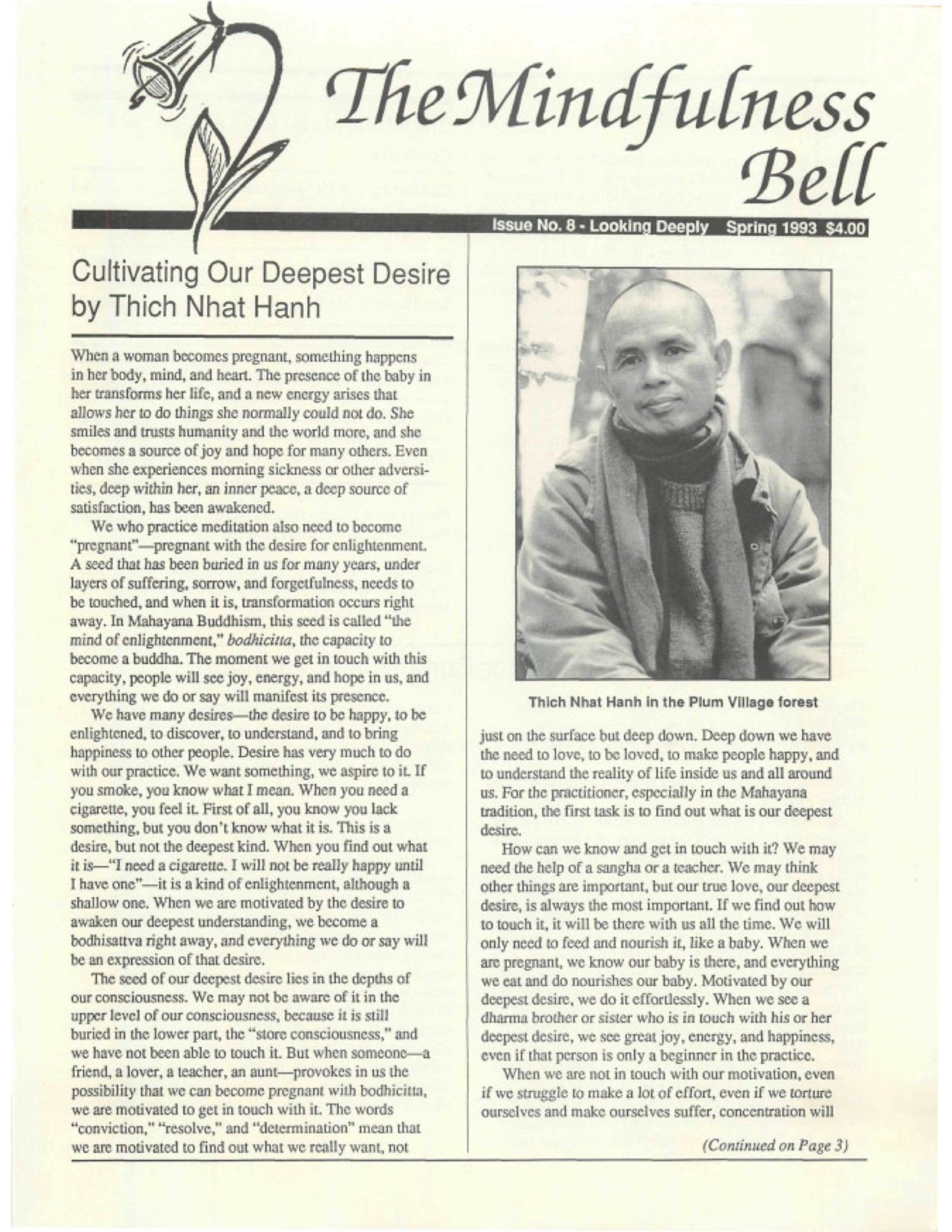Compiled by Sister True Emptiness, Sister True Wonder Adornment, Steve Denney, Therese Fitzgerald, and Carole Melkonian
By Sister Chan Khong, Sister Jina van Hengel in March 1993
Over the last five years, the Vietnamese government has embarked on a policy of doi moi—reforms creating a more open society, particularly economic reforms, but in other areas of life as well. During 1992, it became increasingly common to hear of Vietnamese friends returning to their homeland to visit families and friends and doing so with relative ease.
Compiled by Sister True Emptiness, Sister True Wonder Adornment, Steve Denney, Therese Fitzgerald, and Carole Melkonian
By Sister Chan Khong, Sister Jina van Hengel in March 1993
Over the last five years, the Vietnamese government has embarked on a policy of doi moi—reforms creating a more open society, particularly economic reforms, but in other areas of life as well. During 1992, it became increasingly common to hear of Vietnamese friends returning to their homeland to visit families and friends and doing so with relative ease. This opening has allowed funds to be brought directly into Vietnam and distributed to areas where relief and development work are ongoing. We are now supporting projects in the areas of education, day care, and health care. The recent mailing of our new brochure brought many people in touch with our work. The hearty response to our plea for help is enabling us to support these projects:
Parcels of Aid are sent to those who are desperately poor living in remote areas. Last year, we spent $12,200 to support 40 very needy familes. We also distributed parcels at Tet (New Year) to hundreds of families and monasteries. For people barely surviving, this holiday season intensifies their suffering. A nun who helps distribute the parcels wrote this letter to describe to us the conditions: A young couple had two children to support as well as their aged mother. This morning she gave birth to triplets. They subsist on one meal of rice a day. As this woman is malnourished, both she and her infants suffer from insufficient lactation.
Emergency Aid is often needed during the monsoon season when flash floods destroy coastline villages. In October, $1,000 was sent to assist villagers who survived a typhoon. The following are excerpts from a report from Plum Village describing one nun's journey to these villages and their encounters with the flood victims: The typhoon and flood last October in North and Central Vietnam devastated the provinces ofQuang Tri, Quang Binh, and Ha Tinh, and left countless people without food, clothes, or shelter. It left a wake of destruction that resulted in many deaths in Truong Son and Truong Xuan villages. Those who survived lived in cold and despair.
Thinking that the journey would be too treacherous, the local government refused to send aid to this area. They also advised a group of nuns from Hue not to go, as there was no way to ensure their safety. However, the nuns were determined, and after a difficult journey through rocky hills and across rapid rivers, they arrived at the villages with emergency supplies. The peasants, who had never received aid from the government or others outside their village, were elated at the sight of the nuns arriving with rice, blankets, and money for them. The nuns brought not only material supplies, but also words of compassion and understanding. When our friends returned from their journey, they said that they had the impression of having been to hell and back.
Leper Camps: As there is hardly adequate care for people with leprosy, lepers have been pushed to live in very remote areas where they are unable to acquire materials needed to build their own homes. To shelter themselves, many lepers live in rotten, rat-infested huts. This year $2,500 was contributed toward the work of aiding lepers.
Education is needed for 80% of the children in rural areas of Vietnam who do not attend school. In 1992, we supported 40 university students and 40 elementary school teachers. We also provided assistance to purchase needed supplies at the elementary school in Quang Ngai. The following report is from a nun who teaches at this school: The number of children applying to our school has increased so quickly that we can hardly accept all the applications. Recently, someone asked, "What are you teaching the children that instills such confidence and trust in their parents, some of whom are high cadres in the communist party?" I smiled and said, "Besides teaching them to read and write, I teach two things: to develop compassion in order to protect the lives of humans, animals, and plants; and to develop understanding in order to live in peace with humans, animals, and plants. Guess who taught me that?"
The following letters describe the situations of families receiving tuition assistance: Your gift of a scholarship to Thuy came like a drop of compassionate water from the hand of Avalokitesvara. Thuy's father is paralyzed, and his mother, who has asthma, is the sole supporter of a family including an 86-year-old grandmother and three young children. We wish you could be here to witness how your love reaches desperate people like this family.
Another child wrote: I am twelve years old. I have four younger brothers and sisters. We lost both our parents two years ago. Although our physical conditions are poor, we have your understanding and love. So we vow to study and learn to become good people, worthy of your trust and help.
This year, we will continue to support the School ofLoving Kindness in Hue and other areas by sponsoringteachers, providing tuition assistance for the pooreststudents, and providing funds for classroom furniture andeducational supplies.
Educational training for novices has increased, too. As the Vietnamese government has become somewhat more tolerant of Buddhism, the Ven. Thich Huyen Quang, age 75, has been allowed to return to his monastery that has been closed since 1975 to begin training novices again. With $1,500, we sponsored over 80 monks studying under his guidance. An excerpt of a letter from Thich Huyen Quang follows: At a time when I was wondering where I would find money to repair classrooms and acquire tables, chairs, and food needed for the opening of my classes, I unexpectedly received 13,680 dong ($1,250). This allows 80 novices to practice here for six months. I don't know how to express my surprise and deep thanks for this unconditional help to this poor and remote monastery. It is a relief to know that there are people committed to sponsoring these novices throughout their training. My plan is to buy some ricefields where monks can work to support themselves, so they will not have to rely on the generosity of others for an extended period. To do this, I need financial assistance.

Prisoners of Conscience: Although today in Vietnam there is more individual freedom, including freedom to worship, the changes have been uneven. According to an April 1992 Amnesty International report, many prisoners of conscience remain detained, including religious clergy. Harsh punishment is reserved for those dissidents, particularly from the South, who call for a multi-party system in the country. Laws providing severe punishment for other crimes of dissent remain on the books, such as the one providing 5 to 15 years imprisonment for "causing divisions between the people and the government," including "separating religious followers from the people's government and social organizations." Vietnamese people may feel bolder to express their dissenting views now, but the government climate remains fundamentally one of intolerance and oppression.
Ven. Thich Huyen Quang has spent much of his adult life in prison or under house arrest for the crime of trying to protect Buddhism in a country that is 80% Buddhist. Despite the government's efforts to suppress him, he continues to make statements challenging the government to exercise more tolerance of Buddhists. The following letter was sent by Thich Huyen Quang and to the Vietnamese government in July 1992: There have been widespread persecution of Buddhists since 1975. All temples, large and small, were confiscated by the government and turned over to the state-sponsored Vietnamese Buddhist Church. Religious training.and the operation of monastic schools were severely restricted. An injection of Communist ideology into the schools and religions was administered, while eliminating religious practice from schools and politics. Over the last seventeen years most of the Unified Buddhist Church leaders have died, have been internally exiled for indefinite periods without trial, or have fled the country, while the remaining UBC leaders have been coerced into cooperating with the state-sponsored church.
Although the last five years have seen changes toward a more tolerant policy, these are only "half-way measures." There is still no legal protection for religions in Vietnam. Over the past three years, we have sent letters and petitions to the Vietnamese Government on behalf of Thich Huyen Quang and others who are experiencing religious oppression. Many of us signed this petition at a retreat or public talk with Thay Nhat Hanh in 1991. To illustrate how such a simple act can make a difference in the lives of people determined to maintain their right of free religious expression, please read this letter from Thich Huyen Quang:
I see that friends in the United States sent a total of 24,500 letters to the Government of Vietnam on behalf of myself and other friends who are experiencing religious oppression. I would never have imagined that there were holy people like these friends who don t know me personally but have worked so hard for my freedom. Because of that pressure, the government has started to treat me and my colleagues more humanely. They have allowed me to return to Binh Dinh to reopen the Nguyen Thieu Monastery which has been closed for the past 17 years. I still wish to return to An Quang Temple in Saigon, where I managed the office of the Unified Buddhist Church for more than twenty years. With continued pressure on the government from these unknown friends, I may be able to do this one day. Our letters provided Thich Huyen Quang with the security that he has become too well known internationally to be targeted for harsh reprisal by the government. Instead, the government has responded by trying to ignore his appeals, restrict his movement, punish those who distribute his statements, and intimidate him through police harassment and interrogation. Thich Huyen Quang refuses to let this stop him from seeking religious freedom in Vietnam.
For many years now Vietnam has been shattered economically. Many people are still unable to provide for their basic needs. While the need in Vietnam is enormous, there is a multitude of volunteers—monks, nuns, social workers, medical teams—devoted to the rejuvenation of their country. Thank you for joining us in these efforts to help the Vietnamese people develop their medical, educational, and spiritual base. Please help however you can to become aware of the realities of poverty and oppression in Vietnam and respond to this suffering.



